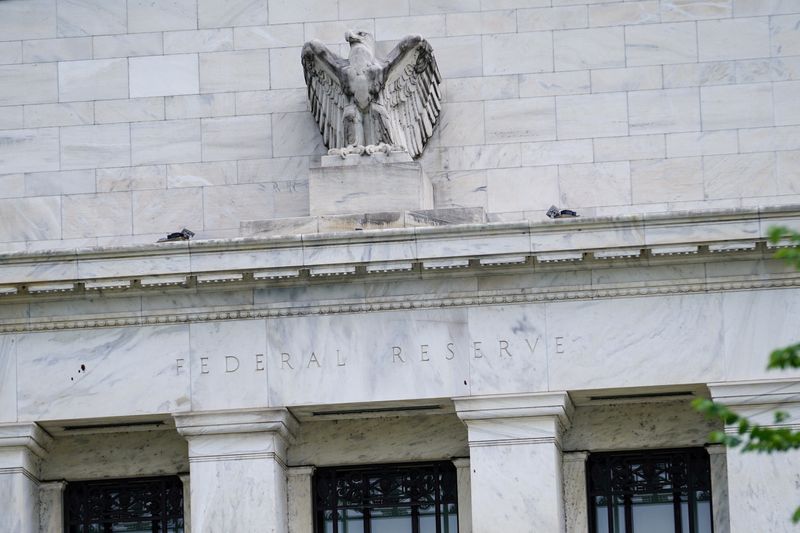By Alden Bentley
NEW YORK (Reuters) -Benchmark U.S. Treasury yields slipped on Wednesday after a benign July U.S. consumer inflation reading appeared to smooth the way for a Federal Reserve easing next month of at least 25 basis points amid lingering division over whether 50 bps is in the offing.
The yield on the 10-year note, along with the two year yield, initially ticked higher after the Labor Department reported its Consumer Price Index increased 0.2% last month after falling 0.1% in June, and increased 2.9% year-on-year. That was less inflationary than June's 3.0% annual advance and the first time the rise has been below 3% since early 2021.
Economists polled by Reuters had forecast the CPI increasing 0.2% on the month and 3.0% over 12 months.
The odds of a rate cut at the Fed's Sept. 17 to 18 policy meeting had been nearly split between half a percentage point and 25 bps. Futures moved in favor of a 25 bps cut after the report, with odds at 64.5% according to LSEG calculations.
The 10-year yield eventually eased below Tuesday's low following the news of a mild increase in July producer prices. Two-year yields held steady.
"The market is thinking that inflation is a little bit more sticky than the Fed was expecting, and they're penciling out some of that 50 basis point pricing,” said Gennadiy Goldberg, head of U.S. rates strategy at TD (TSX:TD) Securities in New York.
“Other than that, I think this really checks the box for the Fed to go in September. And of course, the big question for the market is going to be 25 or 50, and I suspect that's going to be determined over the next couple of weeks.”
Traders are still pricing in a full percentage point of easing from the current 5.25% to 5.5% fed funds rate by year-end. The policy rate has not changed since July 2023, after the Fed hiked from zero starting in March 2022.
Lou Brien, market strategist at DRW Trading in Chicago, said that historical analysis based on last Friday's surprise news of the unemployment rate rising to 4.3% suggested that 5% unemployment could be in the cards by the Dec. 6 release of November's employment report.
From a risk management standpoint the Fed should go with 50 bp in September, if fed funds are to fall by 100 bp over the remaining three meetings in 2024, he posited.
"The (CPI) data was pretty benign and I don't think it gets in way of the Fed making a move in September," he said. "I still advocate that the Fed should be more aggressive at this stage of the game because of where the unemployment rate is."
The yield on the benchmark U.S. 10-year note fell 2.6 basis points from late Tuesday at 3.828%. The 2-year note yield, which typically moves in step with interest rate expectations, was up 1.2 basis points to 3.9537%.
The 30-year bond yield fell 4.6 basis points to 4.1214%.

The closely watched gap between yields on two- and 10-year Treasury notes, considered a gauge of growth expectations, was at negative 12.8 bps, slightly more inverted than its reading of -9.2 bps late Tuesday. An inverted yield curve is generally seen as pointing to a recession.
Hopes of an aggressive 50 bps easing in September briefly shifted the gap between 2- and 10-year yields to a positive 1.5 bps last week, the first time the curve showed a more normal upward slope since July 2022.